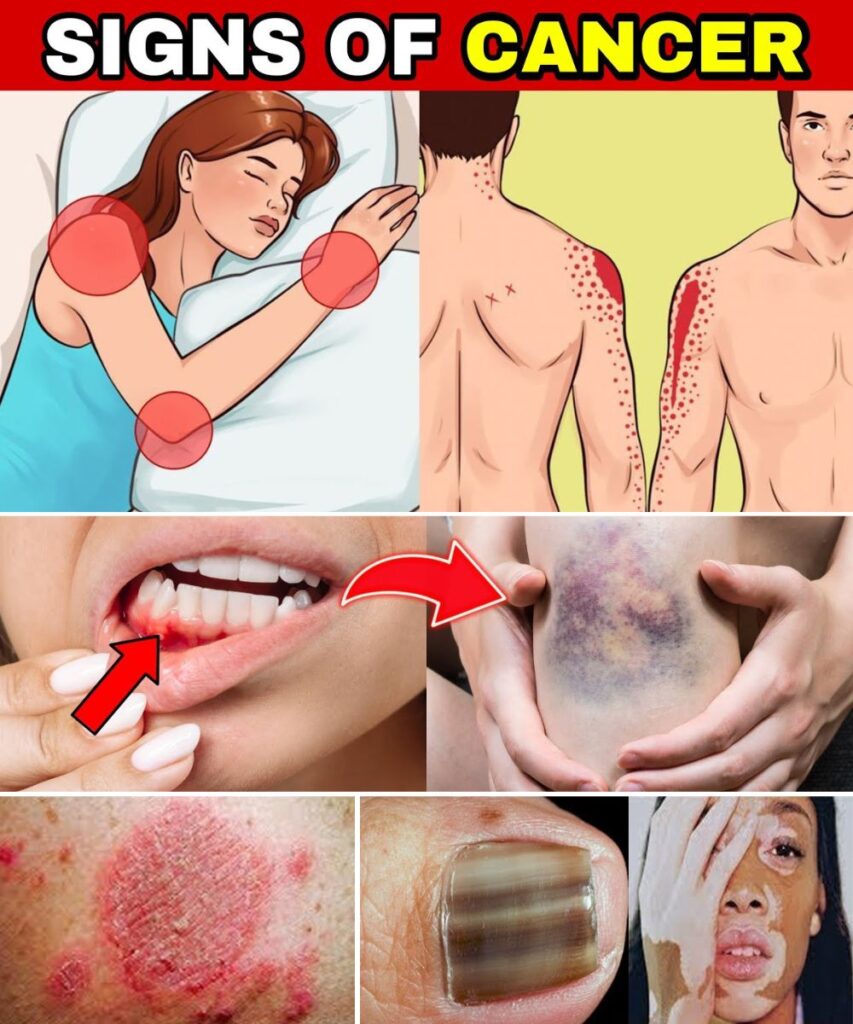🚨 12 Early Cancer Warning Signs You Should Never Ignore – Your Body Might Be Sending You a Message
Cancer is one of the most silent yet aggressive diseases, often developing quietly before any obvious symptoms appear. However, your body has its own way of communicating when something is not right. Sometimes, the signs are subtle—easy to dismiss as everyday fatigue, digestive trouble, or a lingering cough. But paying attention to these early warning signals can make a life-changing difference.
Below are 12 early cancer warning signs that everyone should know and take seriously. Recognizing them early can lead to timely medical care and better outcomes.
1. Unexplained Fatigue
Do you constantly feel exhausted, even after sleeping well or resting enough? Chronic fatigue that doesn’t go away with rest can be a sign that your body is working hard to fight off something more serious.
Fatigue is one of the most common early symptoms of cancers such as leukemia, colon cancer, or stomach cancer. The body may use extra energy to fight abnormal cell growth, leaving you feeling weak, tired, and drained throughout the day.
If your energy levels stay low without a clear reason, it’s important to consult a doctor.
2. Sudden and Unexplained Weight Loss
Losing more than 10 pounds without changing your diet or exercise routine may seem like a blessing—but it can actually be an early warning sign.
Unexpected weight loss can occur when cancer cells affect your metabolism, or when tumors in the stomach, lungs, or pancreas interfere with how your body absorbs nutrients.
If the scale keeps dropping and you’re not trying to lose weight, it’s time to investigate the cause.
3. Changes in Bowel or Bladder Habits
Your digestive and urinary systems are sensitive to internal changes. Persistent constipation, diarrhea, or blood in the stool can be early signs of colon cancer.
Likewise, pain or burning during urination, increased frequency, or blood in the urine may be linked to bladder or prostate cancer.
If your bowel or bladder habits suddenly change and the issue lasts for more than a few weeks, it’s important to get checked.
4. Persistent Cough or Hoarseness
A cough that lasts for weeks, or a hoarse voice that doesn’t improve, can be easy to mistake for a cold or allergy. But if it persists, it could be a sign of something more serious.
Cancers of the lung, throat, or thyroid often show up first through persistent coughing, hoarseness, or difficulty breathing.
When a cough refuses to go away or becomes painful, see a healthcare provider for an examination.
5. Abnormal Bleeding
Any form of unexplained bleeding should never be ignored. This includes bleeding from the nose, gums, or reproductive system, as well as blood in your stool, urine, or spit.
These symptoms can signal internal bleeding caused by cancers in the digestive tract, bladder, uterus, or lungs.
Even minor bleeding that seems random or recurring is worth investigating early.
6. Sores That Don’t Heal
Our skin and tissues naturally repair themselves after an injury. If you have a sore—on your mouth, skin, or private area—that refuses to heal, it could be a red flag.
Chronic sores might indicate cancers such as oral, skin, or cervical cancer.
When wounds don’t close or continue to reappear, it’s your body’s way of warning that something isn’t healing as it should.
7. Unusual Lumps or Swelling
Finding a lump under your skin can be frightening, but it’s also one of the most important signs to notice early.
Lumps in the breast, armpit, neck, or groin could be caused by swollen lymph nodes or tumor growth.
While not every lump means cancer, it’s best to get it checked by a healthcare professional—especially if it’s firm, painless, or growing.
8. Changes in the Skin
Your skin can reveal a lot about your internal health. A new mole or a change in the shape, color, or size of an existing one could indicate melanoma, a dangerous form of skin cancer.
Unexplained rashes, spots, or dark patches may also point to other internal cancers.
Make it a habit to examine your skin regularly and consult a dermatologist for any changes that look suspicious.
9. Digestive Problems and Loss of Appetite
Digestive issues like persistent indigestion, bloating, nausea, or difficulty swallowing are easy to overlook—but when they become frequent, they can be early signs of cancer in the stomach, pancreas, or esophagus.
If eating becomes uncomfortable or you lose your appetite for no reason, it’s important to take note. The digestive system is one of the first to show signs of internal trouble.
10. Unexplained Bruising or Bleeding Gums
Do you bruise easily or notice your gums bleeding without brushing too hard? These can be signs of blood-related cancers such as leukemia, which affect the body’s ability to produce healthy blood cells and clot properly.
Frequent nosebleeds, skin bruises, or prolonged bleeding from small cuts can also be early signs worth checking.
11. Persistent Bad Breath or Strange Body Odor
Bad breath that doesn’t go away even after brushing, or unusual body odors, may indicate internal changes caused by disease.
Oral or throat cancers can cause persistent foul breath, while metabolic shifts linked to certain cancers can alter your body’s scent.
Although not every odor is alarming, a continuous change should prompt a medical check-up.
12. Pain That Doesn’t Go Away
Chronic pain that lingers without an obvious cause can be one of the body’s earliest warning systems. Persistent pain in the back, pelvis, or joints may be linked to cancers of the bone, ovaries, or liver.
Pain is your body’s natural alarm—it’s not something to ignore, especially when it’s new or ongoing for weeks.
Listen to Your Body — It Knows Before You Do
Not every symptom listed here means you have cancer, but none should be ignored. The key is awareness. Detecting changes early gives you the best chance of addressing any issue before it becomes serious.
Your body often whispers before it screams—listen carefully. Schedule regular check-ups, maintain a healthy lifestyle, and never dismiss what feels unusual.
Early detection saves lives. If you notice persistent changes in your body, don’t wait for them to worsen. Seek medical advice and let professionals help you find answers.
Taking care of your health today can make all the difference tomorrow.




